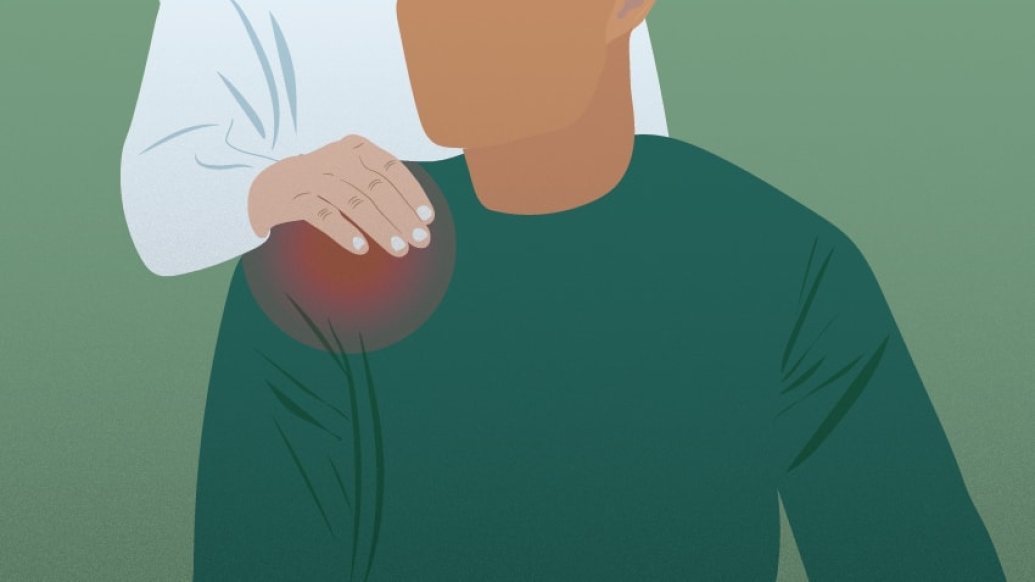A new Michigan Medicine program aims to teach patients about alternative and effective ways to deal with discomfort, and to find strength in each other.
7:00 AM
Author |

Each week, a group of patients comes together to talk about chronic pain. Their stories, once private, share a common thread out in the open.
MORE FROM MICHIGAN: Sign up for our weekly newsletter
Participants detail various injuries, ailments and sources of discomfort. Dialogue also examines the loss of function and isolation tied to chronic pain — troubles that can lead to drug and alcohol use.
It's a cycle that Michigan Medicine social worker Kim Bakhai, LMSW, knows well.
And it's why she recently set up a therapy group to address their distinct needs by helping them learn coping techniques and connect with others in a safe, supportive circle.
"A lot of times, pain isn't visual," says Bakhai. "You can't always tell someone has pain issues. People with pain often feel it's hard for their loved ones to fully understand."
The group, whose members range in age from their early 30s to their late 60s, face issues such as lower back pain and inflammatory bowel disease. Some are coping with post-surgical pain.
The program is housed under University of Michigan Addiction Treatment Services (UMATS); attendees are patients of the ambulatory adult psychiatry or UMATS programs. People with chronic pain, after all, face a higher risk of substance abuse and depression — which makes addressing mental health concerns a crucial step in their journey.
"We focus on understanding pain and finding other strategies for treatment and coping and minimizing the discomfort," Bakhai says. "It really is a cognitive behavioral approach with acceptance strategies."
Strategies for chronic pain
The group's mission isn't to alter or stop the use of pain medication. Instead, it highlights other ways to deal with pain.
Among the tactics that Bakhai highlights each week:
-
Keep a coping journal: Beyond sharing their thoughts in the therapy group, it can be helpful to write down feelings (and progress) on paper. It's a good way, Bakhai says, to reinforce the discussions and techniques outside of meetings. Participants might take note of unhealthy behaviors and examine what positive actions they could pursue instead.
-
Learn to pace yourself: People with chronic pain often try to do too much — and overextend themselves when feeling good — which can escalate pain afterward. Says Bakhai: "We talk about allowing yourself to be productive by estimating how much time you can commit to an activity and then take a rest period before slowly increasing activity time."
-
Practice mindfulness techniques: Perspective matters. "A lot of times when we're uncomfortable, we might fixate on that discomfort rather than mindfully noticing other things," Bakhai says. The approach involves focusing on things in the present moment besides pain, with an emphasis on engaging in activities of pleasure to improve emotional health.
-
Strive for gentle exercise: Although patients might fear or avoid such activity, being active has huge mental and physical benefits with the right supervision, schedule and attitude. "We help them understand why they should talk to their physician about what kinds of exercise are OK," Bakhai says. "You may feel some hurt, but it doesn't mean your body is harmed."
Research put into practice
The group is rooted in research by Mark Ilgen, Ph.D., a Michigan Medicine clinical psychologist who has studied the benefits of behavioral therapy and social support for chronic pain.
These patients, he notes, often have concurrent problems.
SEE ALSO: 3 Easy Exercises for Anxiety Relief You Can Use Anywhere
"There's a lot of overlap," says Ilgen, also the director of UMATS. "Most people with pain have times where they struggle with mental health. And it's often hard for people with drug or alcohol problems to receive pain-related services."
Such individuals benefit significantly from services that allow them to discuss their pain and how this relates to their mental health symptoms or use of alcohol or drugs, says Ilgen, who helped establish the new treatment group to put his research into clinical practice.
And Bakhai is already seeing progress.
Part of that, she notes, comes from helping participants work through their issues together and sending them off each week with effective strategies to move forward.
Says Bakhai: "We work on having more realistic thinking. Yes, you can do a lot of things, but you're going to have to do them differently than you have in the past."
For more information about the chronic pain therapy group for adults recovering from mental illness or substance use conditions at University of Michigan Addiction Treatment Services, email [email protected].

Explore a variety of health care news & stories by visiting the Health Lab home page for more articles.

Department of Communication at Michigan Medicine
Want top health & research news weekly? Sign up for Health Lab’s newsletters today!





